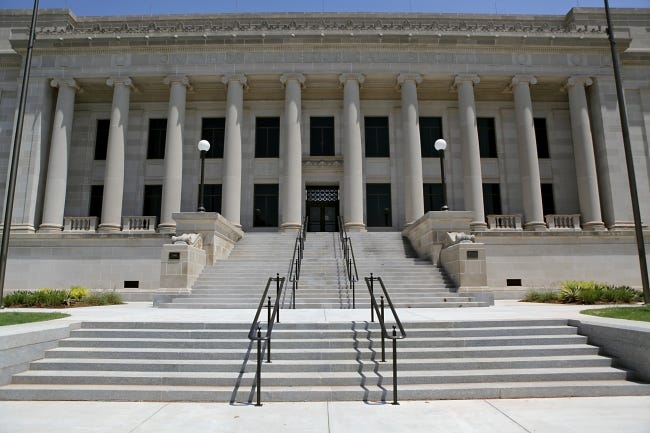In the lead-up to the November 5 vote regarding the retention of three Oklahoma Supreme Court justices—James Edmondson, Noma Gurich, and Yvonne Kauger—over $3.4 million has been channeled into political advertising. Each of these justices has been previously appointed by Democratic governors, and the upcoming election allows voters to decide if these justices will serve another six-year term. Various organizations have targeted the justices with claims cast in political advertisements, asserting their judicial rulings as problematic. To inform voters, The Frontier has analyzed these claims using court documents and other credible sources to present a fact-checked overview.
One claim made against the justices states that their rulings concerning immigrants indicate they are “legislating from the bench.” Specifically, an advertisement from People for Opportunity contends that the justices have made it harder to protect Oklahomans from illegal immigrants arrested for felonies. Upon investigation, this claim was found to be mostly false. In a 2011 ruling, the Oklahoma Supreme Court addressed a law pertaining to the treatment of immigrants without legal permission. While the court upheld most aspects of the law, it struck down the provision that classified illegal immigrants charged with certain crimes as automatic flight risks when it came to bail determinations. The court maintained that denying bail for non-capital offenses should depend on evident proof of guilt or significant presumptions, emphasizing judicial respect for established legal standards over community sentiment.
Another contentious claim alleges that the justices exploited the COVID-19 pandemic to alter state election laws. A paid television advertisement from 46 Action PAC asserts that these justices changed election law through judicial action supported by “liberal trial lawyers.” However, The Frontier found this assertion to be mostly false. The controversy stemmed from a lawsuit initiated by the Oklahoma League of Women Voters and two residents, which sought clarification on the process for submitting absentee ballots amid pandemic-induced constraints. The Supreme Court ruled that existing laws permitted absentee ballots without notarization. The response from the Oklahoma Legislature was prompt, implementing a new bill mandating notarization shortly after the ruling, which Governor Kevin Stitt signed into law.
The advertisements also targeted the Judicial Nominating Commission, with claims indicating that Oklahoma Supreme Court justices are chosen by a “liberal, unelected Judicial Nominating Commission.” While technically true in that the commission consists of appointed, rather than elected, members, this assertion is mixed in its implications. The Judicial Nominating Commission was established through public approval in the 1960s as a response to a judicial bribery scandal. It employs a diverse 15-member board that evaluates candidates for appointment. Despite recent efforts from some Republican legislators to dissolve or alter the commission, it has been defended on grounds of merit-based candidate evaluation, emphasizing the importance of a transparent nominating process that minimizes political bias.
Another claim put forth by Protect Our Freedoms LLC alleges that the Oklahoma Supreme Court halted state Superintendent Ryan Walters from illegally directing taxpayer funds to private religious schools. This claim was found to be mostly true. The court ruled against establishing a Catholic charter school, citing the unconstitutionality of directly funding religious institutions. Justices Edmondson, Gurich, and Kauger were in agreement with this majority opinion, underscoring the state’s obligation to separate church and state. However, it should be noted that some funds are still funnelled to religious schools through private school vouchers, illustrating that the ruling did not eliminate all forms of state financial support for religious education.
As voters prepare to make informed decisions regarding the retention of these justices, it is crucial to comprehend the factual context behind the contentious claims circulating in political advertisements. Fact-checking agencies like The Frontier play an essential role in elucidating the truthfulness of legislative assertions, providing clear evidence to help citizens navigate the often convoluted narratives presented during election cycles. Ratings used by The Frontier serve as a guideline to assess the accuracy of claims—true, mostly true, mixed, or false—indicating how well the statements align with verified information.
Ultimately, the outcomes of the upcoming retention election will have a significant impact on the judicial landscape in Oklahoma. Voters will need to sift through both political ad claims and factual rebuttals to best understand the implications of each justice’s tenure on the state Supreme Court. With substantial financial investments backing both sides of the debate and the notion that these justices may reflect differing ideological perspectives, the November 5 decision represents a critical juncture for Oklahoma voters, one in which factual clarity may serve as a beacon guiding their choices.

